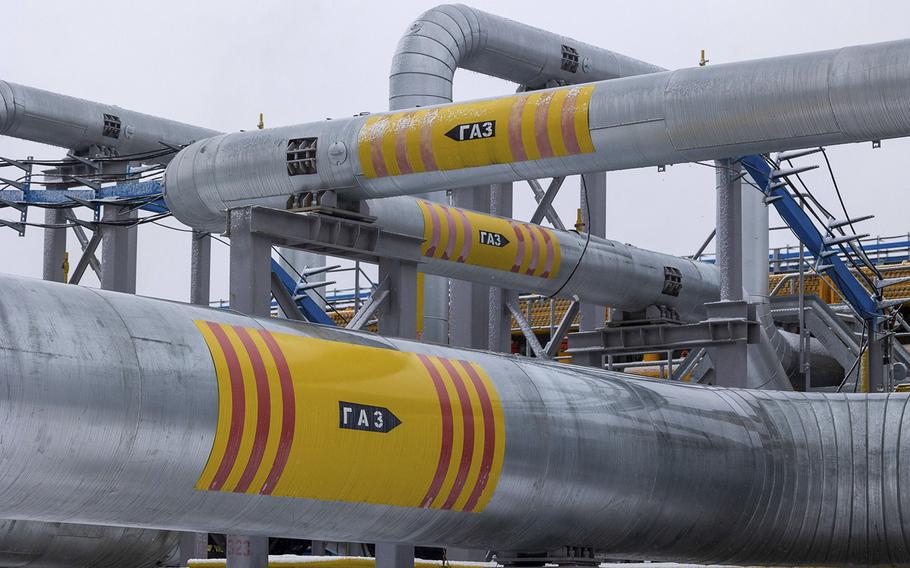
Pipes labeled “gas” in the yard of the Comprehensive Gas Treatment Unit No. 3 at the Gazprom PJSC Chayandinskoye oil, gas and condensate field, a resource base for the Power of Siberia gas pipeline, in the Lensk district of the Sakha Republic, Russia, on Oct. 11, 2021. (Andrey Rudakov/Bloomberg )
Turkey's President Recep Tayyip Erdogan is seeking even closer financial ties with Russia as he attempts to stabilize a troubled economy ahead of next year's elections, according to Turkish officials.
Among his goals are price discounts and lira payments for energy imports, said several Turkish officials who asked not to be identified discussing sensitive information. Turkey's natural-gas bill is set to exceed $50 billion this year, and Russia is its biggest energy supplier.
At a meeting with Russia's Vladimir Putin in Uzbekistan on Friday, Erdogan would seek a 25% discount for natural gas and an agreement that Turkey can pay some of its bill in lira, said senior Turkish officials with direct knowledge of the matter.
People familiar with Moscow's position didn't confirm talks about discounts on gas to Turkey.
Putin said Friday that an earlier deal for Ankara to pay for a quarter of its gas imports in rubles would take effect soon.
"As you know, our agreement for supplies of Russian gas to Turkey to be paid for 25% in rubles will begin to work in the nearest future," the Russian leader told Erdogan as they met for the third time in three months at a multilateral summit.
In the televised part of his comments at the start of their talks, Putin made no mention of taking payment in lira or offering a discount.
Some money has already flowed from Russia. State-owned Rosatom sent around $5 billion in July to a subsidiary that's building a nuclear power plant in Turkey. That transfer boosted Turkey's official reserves.
Turkey is expected to run a current-account deficit of $47 billion at the end of this year, and the lira's poor performance is making it more costly to cover debt. Soaring global energy prices have added an additional burden.
Any help to shore up the economy could provide a major lift for Erdogan, whose poll ratings are hovering at historic lows as inflation speeds past 80% less than a year before elections scheduled for June.
For NATO member Turkey, the relationship with Moscow is not just about potential financial support but a strategic alliance it can use to seek leverage with the West.
Erdogan has had to navigate a tricky position since Russia's invasion of Ukraine. He's presented Turkey as a mediator, and he later helped negotiate a deal to resume grain shipments from Ukraine's Black Sea ports. While helping to arm Kyiv, he's also publicly defended Putin against sanctions and urged nations not to "underestimate" Russia.
Erdogan's relations with Ukraine, including the supply of weapons such as drones, have also long rankled Moscow. But Ankara remains a key partner for Putin as international sanctions imposed over Russia's invasion shutter other routes for trade and investment. This comes after Turkey and Russia have deepened ties over recent years despite frictions over the war in Syria.
Erdogan's also turning to Gulf Arab states for financial help. Treasury and Finance Minister Nureddin Nebati is leading the efforts to secure further assistance from Qatar and the United Arab Emirates, after the two extended swap lines with the Turkish central bank, Turkish officials said.
Turkish policymakers have been pushing for similar deals with Saudi Arabia since a rapprochement began earlier this year. They had hoped for progress when Saudi Arabia's de facto ruler, Crown Prince Mohammed bin Salman, visited Ankara in a June trip that ended years of rancor. Turkish officials have said discussions on the topic has stalled but are seeking to revive them this month.
Saudi Arabia's Finance Ministry and the kingdom's Center for International Communication didn't respond to a request for comment.